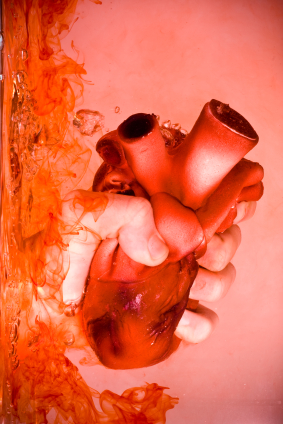Wednesday Bubble: Flashes and sweats and your heart
Be still my heart? Not this week. At least not as far as hot flashes and night sweats go. In fact, study findings that will be presented this coming weekend at the Endocrine Society ‘s 94th Annual Meeting suggest that hot flashes and night sweats that many women experience early in their menopause are not related to an increased risk for heart disease.
So what’s the 4-11?
Researchers have previously questioned whether or not timing of symptoms play a role in a woman’s increased risk for heart disease during menopause. They’ve found that experiencing symptoms only around the time menopause begins may actually reduce the risk for heart disease, or the risk of stroke, heart attack or death (compared with women who experience symptoms later). (If you’d like more about heart disease, aging and menopause, an archive of posts can be found here). To learn more, they have now analyzed the presence of markers in the body that have been linked to heart disease risk (e.g. high blood pressure, cholesterol, blood sugar, insulin, and specific blood markers that might indicate inflammation), in almost 60,000 women who were in menopause and had participated in the Women’s Health Initiative Observation Study.
These women were separated into groups, depending on the presence and timing of vasomotor symptoms:
1) No symptoms
2) Symptoms at start of menopause but not at the start of the study
3) Symptoms both at the start of menopause and the start of the study
4) Symptoms at the start of the study but not at the start of menopause
Importantly, women who had symptoms early in their menopause but not late did not appear to have elevated markers that may indicate heart disease risk. In comparison to this group, women whose vasomotor symptoms occurred only late in menopause appeared to have increased risk, mainly due to higher blood pressure and higher white blood cell counts. Those whose symptoms started early and persisted appeared to have higher levels of glucose and insulin, which indicated an increase in the risk for diabetes.
The researchers, who harken from Northwestern University, note that it’s unclear why timing of symptoms may influence heart disease, although the lead investigator, Dr. Emily D. Szmuilowicz has speculated that symptoms that occur long after menopause begin may indicated some sort of blood vessel abnormality. And while she and her colleagues have not suggested a strategy to attenuate this risk, it is clear that due diligence is needed. If your symptoms persist well into your menopause, see your health practitioner and ask him or her to run some tests. More importantly, hindsight is 20-20; be sure to instill lasting heart healthy habits early and maintain them while you age.
Read More
Newsflash! U.S. Preventive Services Task Force Weighs in on HRT
Just like the Energizer bunny. HRT and bad news. When are women and practitioners going to believe the data and stop trying to find the silver lining?
This month’s news is from the U.S. Preventive Services Task Force, who issued a recent update of the evidence for or against the use of hormone replacement for menopausal symptoms; that update appears in the online edition of Annals of Internal Medicine.
Rather than bore you with the details, I’m going to cut to the chase and get to the heart of their findings:
- Estrogen plus progestin or estrogen alone provides significant protection against hip and vertebral fractures that result from osteoporosis and aging.
- Contrary to initial results from the Women’s Health Initiative study, use of estrogen plus progestin significantly increases the risk for invasive breast cancer. Estrogen alone offers some protection against invasive breast cancer.
- Updated analyses also demonstrate that combination HRT also significantly increases risk for stroke, blood clot events, death from lung cancer, gallbladder disease and urinary incontinence.
- Estrogen alone increases the risk for stroke, blood clot events, gallbladder disease and urinary incontinence.
One of the primary arguments that proponents of hormone therapy have used consistently is that these data are restricted to women who are older and are not applicable to women who are perimenopausal or in the earliest stages of menopause. And yet, a variety of medical organizations caution against using HRT as a chronic disease prevention strategy, including the Canadian Task Force on Preventive Health Care, American Heart Association and American College of Obstetricians and Gynecologists.
Even the FDA posits that if you are going to use hormone replacement, you should use it in the short-term and only for ameliorating menopausal symptoms or preventing bone loss. And yet, if you read through four years of Flashfree or click on the tag cloud, you’ll find a number of alternative strategies to offer relief without the slippery risk slope.
What more can I say? Be informed so that you can make informed decisions. If a few less hot flashes or night sweats in the short term means a potential road of illness in the long-term, the benefit-risk ratio may not be worth it. Then again? Only you can decide.
Read More
Newsflash: Estrogen only joins “avoid long-term hormone therapy use” recommendations
How many times does one need to get hit over the head before they have that “ah-ha” moment?
That’s pretty much the party line when it comes to hormone replacement therapy, or HRT. I’ve been writing about HRT since I started this blog. And I have been reading study after study that ultimately come to the same conclusion: long-term use of any hormones is unsafe.
I know that there are naysayers out there who don’t want to believe. Even the International Menopause Society continues to dispute the link between combined hormones and breast cancer. Yet, I wholeheartedly believe in free will and choice, informed decision-making needs to lead the way when it comes to your health.
And so, in the latest wrench to be thrown into the HRT argument, researchers from Brigham and Women’s Hospital in Boston, reporting from the annual American Association for Cancer Research meeting, that the longer that any hormone replacement is used, regardless of whether or not it is estrogen plus progesterone or estrogen alone, the higher the risk for developing breast cancer.
Did you read that?
Lead researcher Wendy Y Chen is quoted in the Association’s newsrelease as saying that while it’s “already been confirmed that patients shouldn’t be undergoing estrogen plus progesteron hormone therapy for the long term,” (you can read about that here), “what we found is that people should also be careful about longer-term use of estrogen-alone [hormone therapy].”
Chen and her team evaluated data collected during the Nurses Health Study over a period of 28 years. They found that of the 121,700 women who took part in the study who were between the ages of 30 and 55 in 1976, and used combined hormones for 10 to 14.9 years, had an 88% higher risk of developing breast cancer than women who did not use HRT. Moreover, this risk increased to more than two-fold in women using it up to almost 20 years. And although the risk was comparatively lower for women who used estrogen only, they still had an 22% increased risk for up to 14.9 years and a 43% increased risk for up to 20 years compared to non-users.
Importantly, when the researchers restricted the population to the same that was observed in the Women’s Health Initiative study (i.e. healthy, active postmenopausal women ages 50 to 79 with an intact uterus), they observed a decline in breast cancer risk among women who used estrogen only therapy for less than five years but continued to observe an increased risk among women currently using estrogen fo 15 to 20 years.
Chen emphasizes that the data do not demonstrate an increased risk for dying from, although they continue to study this particular factor for additional clues.
So, what’s the upshot?
Long-term use of any kind of hormone therapy, estrogen alone or in combination with progesterone, significantly increases the risk for developing breast cancer. Is this increased risk worth a decline in hot flashes, night sweats, mood swings and vaginal dryness? Only you can decide.
Read More
Bioidentical hormones for menopause: what’s the latest?
It’s been some time since I covered the topic of bioidentical hormones. And with the lastest review of the Women’s Health Initiative data and yet another push in favour of hormone replacement therapy (HRT), I thought that an update was in order, particularly because the naysayers continue to emphasize that HRT is the end all to be all and that there are not evidence-based alternatives.
Think again.
For those of you who need a refresher in bioidenticals, they are hormones that are molecularly similar to those produced naturally by the body. HRT is manufactured and consequently, has been shown to alter how cell receptor bind to these hormones and function. Bioidentical hormones are often compounded in specialized pharmacies, i.e., they are individualized as directed by a health professional to the exact dosage and regimen required, based on a woman’s personal symptoms, hormone levels, and preference. Yet, claims that they are safer and equally effective alternatives have been challenged, namely due to the lack of scientifically sound data.
At last, that challenge is beginning to change, as more and more women turn away from HRT. In a recent study published in the open access journal BMC Women’s Health, researchers observed 296 menopausal women receiving compounded bioidenticals from six community pharmacies over a period of 7 years.The majority of women in the study were an average of 52 years old, in good health, and of moderate to average rate; most had not used HRT before. Although various compounded forms of bioidenticals were used in the study, the majority were topical, followed by oral, vaginal and under the tongue (sublingual). Moreover, all women were started at low doses of either progesterone as a single therapy or in combination with estrogen and then adjusted accordingly.
Overall and within three to six months after starting therapy, women reported significant improvements in their mood, including at least a 25% reduction in mood swings, irritability and anxiety. They also reported improvements in night sweats and hot flashes. Moreover, women who started on progesterone only therapy had much greater reductions in their mood symptoms compared to women who started on combination therapy.
Bioidentical hormone therapy also proved to be safe, with no woman experiencing a heart attack or developing breast cancer, although importantly, longer follow up times are needed before safety can be firmly established.
So, what are the drawbacks here? First, this was an observational study and undoubtedly, by relying on women to self report symptoms, there’s always room for bias. Still, this is the first well designed trial looking at compounded bioidentical hormones as opposed to manufactured formulations. And, while significant improvements were seen in mood symptoms, the verdict is still out with regards to vasomotor symptoms, i.e. night sweats and hot flashes.
Like any therapy, hormone or alternative, speak to a health practitioner first. Make choices based on information, not simply advice. Right now? Compounded bioidentical hormones appear to offer an advantage over HRT but more study is needed. Clearly, they may not offer the same benefits in terms of flashes but again, more research is needed.
I like the fact that scientists are starting to pay attention. You?
Read MoreWednesday Bubble: More on breast tenderness, hormone replacement and breast cancer
More bad news on the hormone replacement front: if you are taking estrogen (conjugated equine estrogen) with progestin (medoxyprogesterone) for menopausal symptoms and experience breast tenderness, you may want to think twice.
Frankly, this news isn’t exactly new. Because back in 2009, UCLA researchers reported similar findings in the Archives of Internal Medicine. These newer data, provided by the same researchers at UCLA’s Jonsson Comprehensive Cancer Center and published online in Breast Cancer Research and Treatment only add to the hormone risk fodder.
The researchers say that in their research, they’ve consistently run across data that suggest that “estrogen plus progestin compared to estrogen alone, have a more marked effect on breast tissue,” possibly due to more growth, leading to greater density. According to the lead study author, Dr. Carolyn Crandall “higher breast density (has been shown to be) associated with a higher risk of breast cancer,” adding that “in women with extremely dense breasts, the cancer risk can be four to six times higher than for women whose breasts are not dense.”
In this update, Dr. Crandall and her colleagues reviewed data from the Women’s Health Initiative, specifically focusing on reports of new breast tenderness. At the study’s start, almost 12% of women taking estrogen alone or estrogen in combination with progestin reported having breast tenderness. However, by the first year, women in the combination hormone therapy group reporting onset of breast tenderness after starting hormones had a 33% greater risk of developing invasive breast cancer compared with their peers who did not have breast tenderness. And while estrogen alone also increased the risk for developing breast tenderness, the effect was less than that of the combined hormones, especially since it did not lead to an increased breast cancer risk.
So, what to make of these new data? If you are taking HRT and develop breast tenderness, you need to speak to your health practitioner, assess your risks and make a joint decision as to whether or not the benefit of fewer menopausal symptoms is worth the risk of possibly developing an invasive form of breast cancer. And if you are not yet using hormone therapy, you may just want to step back and think twice.
Buyer beware: hormone therapy is a slippery slope with bumps, bruises and perhaps serious disease. Is it worth it? Only you can decide.
Read More










